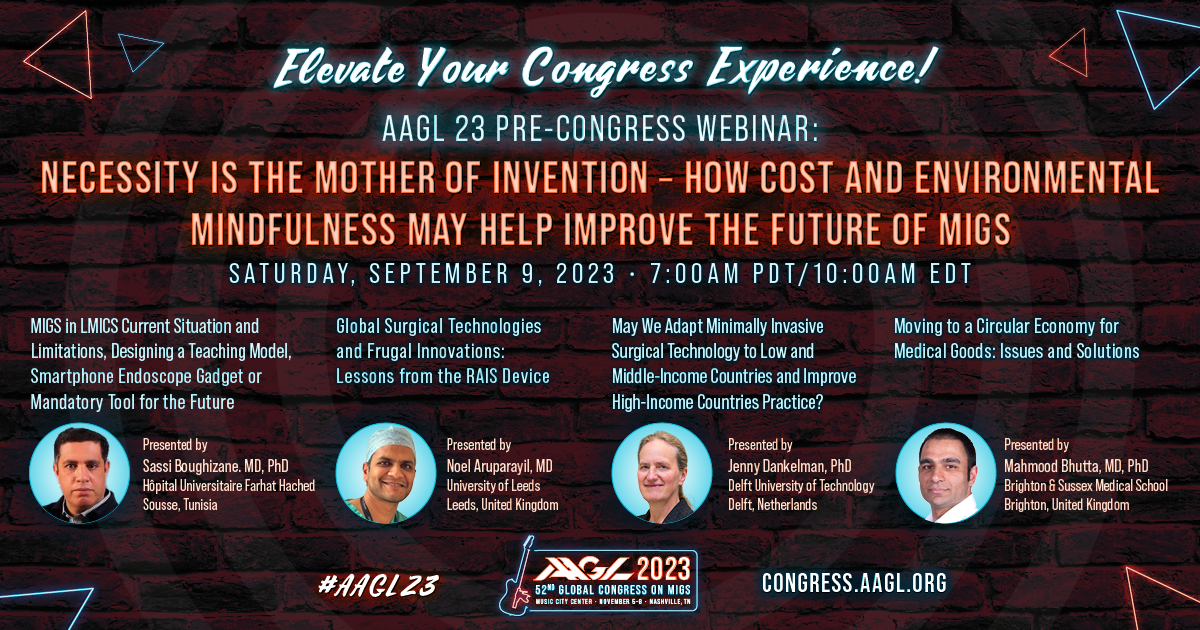
- This event has passed.
AAGL 23 Pre-Congress Webinar: Necessity is the Mother of Invention – How Cost and Environmental Mindfulness May Help Improve the Future of MIGS

AAGL 23 Pre-Congress Webinar: Click here to register.
Webinar Topic: Necessity is the Mother of Invention – How Cost and Environmental Mindfulness May Help Improve the Future of MIGS
Presented by:
Sassi Boughizane, MD, PhD, Hôpital Universitaire Farhat Hached, Sousse, Tunisia
Title of your Talk: MIGS in LMICS Current Situation and Limitations, Designing a Teaching Model, Smartphone Endoscope Gadget or Mandatory Tool for the Future
Noel Aruparayil, MD, University of Leeds, Leeds, United Kingdom
Talk Title: Global Surgical Technologies and Frugal Innovations: Lessons from the RAIS Device
Jenny Dankelman, PhD, Delft University of Technology, Delft, Netherlands
Talk Title: May We Adapt Minimally Invasive Surgical Technology to Low and Middle-Income Countries and Improve High-Income Countries Practice
Mahmood Bhutta, MD, PhD, Brighton & Sussex Medical School, Brighton, United Kingdom
Talk Title: Moving to a Circular Economy for Medical Goods: Issues and Solutions
Webinar Description: In all countries the cost of medicine and of surgery are a major problem. In developed countries the costs are becoming too high for national health systems as well as for individuals covered by private insurances. In low- and middle-income countries the concerns about costs are essential as less money is available for national health coverage and most patients cannot pay a personal coverage.
On the other hand, the climate costs of surgical procedures are becoming a major concern as operative rooms carbon footprint is very high.
Access to surgical care is known as a major problem in low and middle income countries, whereas in high income countries the problem is often overlooked and or intentionally neglected, although patients do not have an equal access to care throughout these countries as in remote geographical areas competent surgeons are lacking and patients with limited economical resources are for instance less likely to benefit from minimally invasive surgical techniques.
These problems are more serious for minimally invasive surgical procedures which require a more complex technological environment and specific surgical abilities not always acquired during the initial surgical curriculum.
To overcome these major problems, economically and ecologically sustainable surgical techniques should be developed while insuring optimal patient care. Imagination is always more productive when the situation is more demanding. Therefore, current developments ongoing in countries with more difficult economical situations will likely be essential to help minimally invasive surgeons to provide access to care worldwide as well as to decrease the carbon footprint of surgery.
Learning Objectives: At the end of this course, the participant will be able to: 1) Participants will understand how the situation is difficult for many patients who have little or no access to minimally invasive techniques; 2) Participants will discover that many affordable alternatives are being develop all around the world; 3) Participants will understand that these alternatives are the results of collaborations lead by surgeons working in the countries where access to care is difficult. As they are the only surgeons able to design solutions adapted to their settings to provide safe and effective treatment to most patients; 4) Participants will understand that many of these more sustainable approaches may or even should be adopted in most countries to maintain healthcare and particularly surgical costs at reasonable levels; 5) Participants will know that carbon footprints of each specific procedure may be decreased in more economically constraints practice. So that climate objectives will likely be more easily reached when effective collaborations between surgeons all around the world will become a daily reality. Indeed, recent technological progresses have the potential to improve surgical care, but these progresses will have to be adapted to bring these progresses to most patients whatever their economical level; 6) Participants will be able to convince industry partners, that these changes are unavoidable and will be mandatory within the next few years, that these cheaper approaches will be spread worldwide and that industry partners who will engage early in these strategies will soon benefit from their choices. Proposing a more ethically and ecologically sustainable technology will soon be the major marketing argument, patients and female surgeons will be the main ambassadors of these changes.